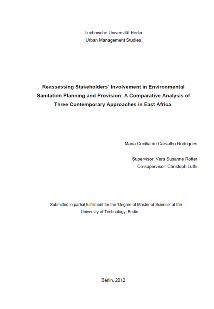Reassessing stakeholders’ involvement in environmental sanitation planning and provision - A comparative analysis of three contemporary approaches in East Africa
de Carvalho Rodrigues, M.C. (2012)

Published in: 2012
Publisher:
MSc Thesis, Technische Universität Berlin, Fakultät VI – Planen, Bauen & Umwelt, Master’s Program of Urban Management Studies, Berlin, Germany
Author:
de Carvalho Rodrigues, M.C.
Uploaded by:
SuSanA secretariat
Partner profile:
common upload
6256 Views
170 Downloads
Location of library entry
Content - Summary
Current figures regarding the lack of environmental sanitation services in developing countries pose a great challenge to governments, the private sector, planners and local communities and worsen health and environmental living conditions of millions of people. Local governments have demonstrated limited capacity to cope with the rapid population growth in urban settings and provide impoverished informal and unplanned settlements with infrastructure and basic services such as sanitation. The shift of focus towards attributing more responsibilities to the private sector during the 1990s also showed to have limited capacity to reach the urban poor. In this context, innovative approaches to sanitation have emerged highlighting the need for stakeholders’ participation, especially beneficiaries, in order to provide more appropriate solutions to contexts and users’ needs and to guarantee more effective allocation of scarce resources, thus more sustainable sanitation systems. Nevertheless, theory shows little evidence to support participatory approaches in practices in urban settings and little research has been conducted to address the kinds of participation in different planning stages.
This research investigates and evaluates three pro-poor participatory contemporary approaches to urban sanitation validated in East-Africa, based on secondary data and interviews conducted with key informants of each project. An analytical framework was elaborated to support the answering of the research questions of how participation is applied to the approaches and to what extent the modes of participation adopted by the projects contribute to the achievement of the claims for participation found in the literature. The analysis aggregates three parameters, namely the assessment of project activities through nine generic planning stages, the assessment of stakeholders based on their interest and influence and the assessment of modes of participation regarding the planning stages. This research recognizes the application of different modes of participation in planning stages and discusses their strengths and weaknesses to find that there is a predominance of consultative modes to involve the community throughout the process. Furthermore, this study is concluded with recommendations to the academia and the praxis with basis on the findings of this research.
Last update: 19.11.2012
Bibliographic information
de Carvalho Rodrigues, M.C. (2012). Reassessing stakeholders’ involvement in environmental sanitation planning and provision - A comparative analysis of three contemporary approaches in East Africa. MSc Thesis, Technische Universität Berlin, Fakultät VI – Planen, Bauen & Umwelt, Master’s Program of Urban Management Studies, Berlin, Germany
Filter tags
Case studies in other formats English Sub-Saharan Africa Urban (entire city)














